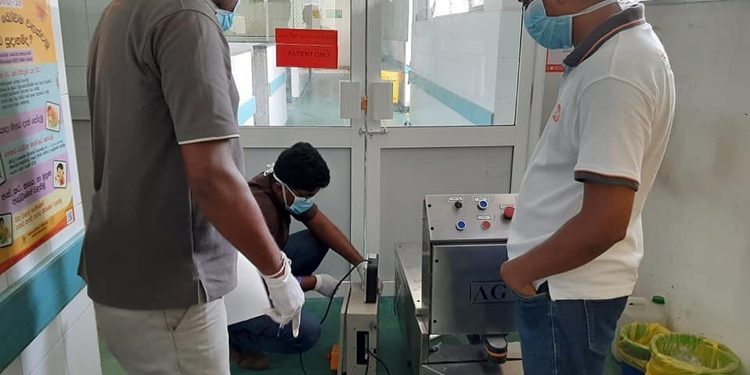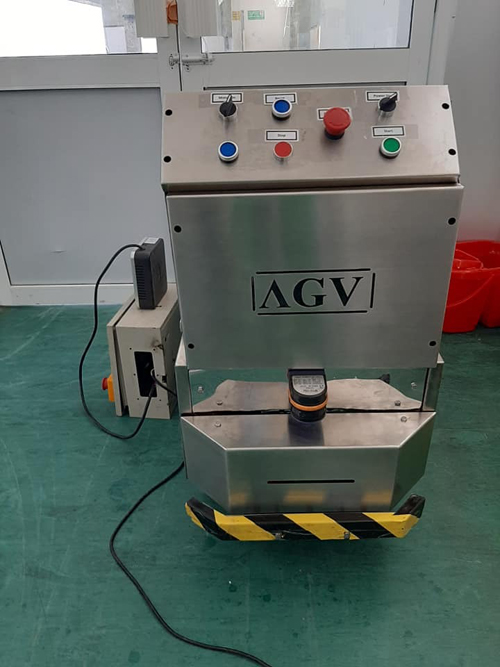Indigenous robots to look after COVID-19 cases in Lankan hospitals
Posted on March 28th, 2020
Courtesy NewsIn.Asia
Local company Atlas, a subsidiary of Hemas, has manufactured and supplied the robots to Homagama hospital.

Colombo, March 28 (newsin.asia): At the Homagama Base Hospital near Colombo, indigenously manufactured robots called Automated Guided Vehicles (AGV) will be used to assist the treatment of persons suspected to have been infected by the COVID-19 virus.
The robots had been designed by the Sri Lankan company Atlas, a subsidiary of Hema’s.
It will now be possible to send medicines and other substances to the patient through these robots. Using the camera and speaker in the robot, it will now be possible to communicate with the patient without coming into close contact.
This has been custom built for this very purpose of looking after patients in isolation wards by the Sri Lankan company Atlas – a subsidiary of Hemas. The robot has been built using mostly materials sourced locally.
Though this is the first time I witnessed an appliance of this nature made in Sri Lanka,” said Dr Anil Jasinghe, it has been very well designed and developed.”
Built with sensors, this smart appliance can stop in its tracks without colliding with objects and persons in front of its path. Each bed in the ward is tagged with what is termed as an RFID identification. The robot is sent to the required bed by giving the respective identification tag. Among its sophisticated features is also the ability to control the speed of its movement. By pressing the home” button, the robot is brought back to the originating point.
These robots save not only manpower hours but also ensures the safety and protection of the hospital staff.
Considering the prevailing situation in the country,” Dr Jasinghe further said, I request from the Hemas subsidiary Atlas Company to provide us with 25-50 of these robots.”
Besides the Homagama Base Hospital, the center used by Voice Of America in Uswatakeyya will also be converted to monitor and treat patients suspected to be infected with COVID-19. This unit will be ready In about four days, noted Dr Jasinghe. Likewise, a large number of hospitals throughout the Island will be soon equipped with special wards with isolation units to manage the situation, he stated.
Accordin to Hema’s, the AGV can carry food and medicine to patients and perform basic medical check-ups, such as checking temperatures. It also enables doctors to monitor patients remotely, while having conversations with them through the cameras mounted on it. In addition to this, the AGV can charge itself using a wireless charging port, further reducing its physical proximity to healthcare workers. The use of the AGV will automate patient monitoring, thereby enabling healthcare workers to apply their expertise in managing the crisis more efficiently and to stay safe while saving lives.

Dr. Indika Jagoda, the Regional Director of Health Services, Colombo lauded the launch of the prototype AGV. It is truly remarkable that a Sri Lankan company has developed a home grown robotic medical assistant. The advancement of technological development is vital in the fight against this pandemic. The ready access to patients that healthcare workers have without putting themselves at risk, thanks to the AGV robot, is truly a massive advantage in the fight against COVID-19,” he said.
Speaking on the initiative, Asitha Samaraweera, Chief Executive Officer, Atlas Axillia said, I am extremely proud of our team for creating a solution to address one of the challenges our medical personnel are facing today in the country with respect to infectious diseases such as the Coronavirus. We humbly share this invention to further the national cause to effectively combat COVID-19. We are gifting the prototype to the Homagama Hospital, as it is a designated facility to treat COVID-19 patients exclusively”.
As a company with the national interest at heart for over 60 years, we have remained focused on contributing to Sri Lanka’s economy by investing in the country. This innovation by our team is the best way for us to do so in this critical time of need, ensuring that we are enabling our healthcare workers to fight the spread of this pandemic more efficiently,” Asitha Samaraweera added.
Currently, healthcare providers who work closely with infected patients use Personal Protective Equipment (PPE) when treating them, at great physical discomfort to themselves. The deployment of the AGV will ease this burden to a great extent, where one-on-one patient interaction is focused on mandatory and critical health requirements.
Dr. Janith Hettiarachchi, Medical Superintendent, Base Hospital Homagama, thanked Atlas Axillia for stepping in to help the nation at this crucial juncture. The most important thing in a situation like this is keeping our staff safe. If even one of our staff is infected, the entire team will have to undergo quarantine, upsetting the entire operation. To have a robotic nursing assistant doing the work that a human healthcare worker would otherwise have to do, significantly reduces the chance of an infection and is therefore invaluable. This is apart from the large monetary saving the state makes, from not having to use multiple sets of expensive PPEs by healthcare workers to interact with patients each day.”
The AGV was developed by a team of innovators within the manufacturing and engineering division of Atlas, led by Viraj Jayasooriya, COO / Director Operations. The team, which practices manufacturing innovation, developed the AGV originally as a robotic assistant to carry goods within the Atlas production facility. With the outbreak of the Coronavirus, the team immediately began innovating the existing model to create a machine that can be used at hospitals, as a remote medical assistant.
Viraj Jayasooriya from Atlas said, Our teams designed and fabricated the entire robot from scratch and have been working around the clock the past few days to perfect the modifications that will enable it to monitor COVID-19 patients. Medical professionals are constantly in danger of being exposed in the frontlines. With the AGV in place, we can minimize the need to send humans inside the ward, as the robot goes to each bed in multiple wards and allows the remote monitoring of patients by doctors. We welcome organisations who are interested in scaling up the production of this robot, in order to deploy them for the support of more medical personnel combating COVID-19.”
Atlas intends to secure all design and patent rights in respect of this invention as soon as the circumstances permit it, in order proceed with further development.